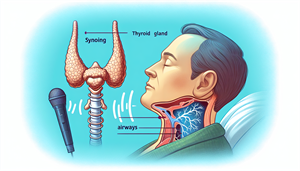
Why Do Fat People Snore?
Wondering why fat people snore? It’s often due to extra weight leading to narrowed airways and softer throat tissue, which vibrate and cause snoring. This article unpacks the science behind this, exploring how neck and central body fat contribute to the issue and what you can do about it.
Key Takeaways
Obesity increases the risk of snoring and sleep apnea due to excess fat around the neck compressing the upper airway, central obesity impacting lung function, and fat accumulation in the tongue and around the airway. Sleep apnea, a condition marked by repeated pauses in breathing during sleep, is prevalent among 40% of obese persons and can result in serious health risks like hypertension, stroke, and diabetes if untreated. Effective interventions for breaking the cycle of snoring and obesity include weight loss programs, using anti-snoring devices and mouthpieces, adopting healthier sleep habits, and addressing other factors such as alcohol and nasal issues.
The Science Behind Obesity and Snoring
There’s a complex relationship between weight gain and snoring. Weight gain significantly contributes to snoring, as it’s a major risk factor. When a person experiences weight gain and snoring issues, it is often due to the compression of the upper airway resulting from the accumulation of excess fat around the neck. This fat constricts the airway, disrupting the normal flow of air and leading to the characteristic sounds of snoring. Interestingly, the story doesn’t end with just a disturbed sleep cycle. Snoring, in turn, can lead to severe complications such as sleep apnea. In fact, around 40% of obese individuals experience sleep apnea. Quite a hefty number, isn’t it? While obesity is a significant trigger, other factors such as congested nasal passages from colds or allergies, and even the position in which you sleep, can contribute to snoring.
The Role of Neck Fat
Focusing on the impact of neck fat on snoring reveals some fascinating insights. The fat around the neck can compress the upper airway, creating a narrower channel for air to flow. This increased resistance can lead to turbulent airflow resulting in louder snoring sounds. A neck size exceeding 16 inches is often a red flag, suggestive of an increased risk of snoring, which is often correlated with a higher body mass index.
Impact of Central Obesity
Central obesity, which refers to an excessive accumulation of fat around the midriff and chest area, also plays a pivotal role. This extra fat can indirectly compress the upper airway, restrict lung function, and contribute to obesity hypoventilation syndrome, a serious respiratory complication. Central obesity can lead to a decrease in lung volume and capacity, potentially worsening snoring and sleep apnea. Moreover, fat accumulation in the tongue and around the pharyngeal airway can lead to impaired lung function, further exacerbating snoring and sleep apnea. Simply put, central obesity can cause a domino effect, compressing the upper airway, reducing lung capacity, and worsening snoring and sleep apnea.
Sleep Apnea: A Major Health Concern for Obese Individuals
Moving on, sleep apnea, a serious health concern and one of the sleep breathing disorders, has a strong correlation with obesity. Repeated pauses in breathing characterize this condition during sleep. Among obese individuals, the condition is quite prevalent, with 40% of them being patients experiencing sleep apnea. Addressing sleep apnea can help individuals achieve a good night’s sleep. Interestingly, snoring is not just a noisy annoyance but can be a telling sign of sleep apnea. It is noteworthy that 95% of people with obstructive sleep apnea snore, and an intriguing 80% of individuals who snore are found to suffer from this sleep disorder. If left unaddressed, sleep apnea can result in serious health risks including hypertension, stroke, diabetes, Alzhei


